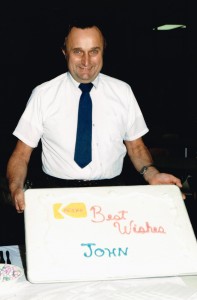Chili resident recounts hardships of WWII in Eastern Europe

“When we heard that war would break out, we knew we had to get out as quick as possible,” says Chili resident John Figur, an ethnic German born in Ukraine, remembering his early childhood spent enduring the hardships of World War II.
War was spreading through Eastern Europe in 1939. In western Ukraine, the idyllic farming life of four-year-old John Figur and his family had already begun to unravel when his father, a respected farmer, disappeared. He was taken along with many other men who were deemed a threat by Soviet Russia.
The entire village of about 20 German families then decided to flee ahead of the advancing Soviet army. John’s family took with them one cow, one sheep, their dog and a horse pulling their covered wagon.
The German army met them at the Polish border, where their wagon was taken and his stepfather conscripted. The family moved to army housing in Poland and a younger brother was born. Then, the front drew closer.
“We had no notice, no food, nothing – we had to leave and walk back toward Germany,” John recalls of again fleeing the Soviet army. Along the way, retreating German armored carriers would sometimes stop and give them a short ride.
The refugees boarded a train at the German border; it halted outside of Dresden. The entire city had been bombed and the tracks just stopped. They got off the train, walked through a devastated city, and boarded a train on the other side. John was about 10 years old when they reached a refugee camp.
“In Leipzig, there was nothing to eat. We went out to the fields to collect frozen potatoes, onions, whatever was left.” John’s stepfather was released near Bayreuth when the German army disbanded, and the family joined him there.
They were considered displaced persons, not welcome by Germany because they had started the war living in Ukraine. The Americans and Soviets, who were redrawing the borders of Europe, asked refugees to choose where in German territory they wanted to resettle. John’s mother and stepfather chose to keep their family in Bayreuth in western Germany, while an aunt and uncle (his birth father’s siblings) were persuaded that a better life waited in eastern Germany.
“The Russians promised so much,” says John, shaking his head. The trip into Soviet-controlled eastern Germany ended in Siberia, where Aunt Ella and Uncle Leo were forced to work in the coal mines. It would be the early 1980s before John’s sister tracked them down through letters exchanged with the help of the Red Cross. They were still living in Siberia.
Meanwhile, the Figur family moved to a one-room house and walked 10 miles daily to labor on a farm. Every day the farmer would give what he could: just enough for each family member to have a daily cup of milk and slice of bread.
With little options for schooling, John learned to grind glass at a nearby trade school. The family then applied with the Lutheran Church for emigration to America and the owner of a 1,200 acre fruit farm in Chambersburg, Pennsylvania, sponsored the whole family.
“We came over not knowing a word of English,” recalls John, “just ‘okay,’ and ‘no’!”
They arrived at the farm late on Easter, 1952. A feast covered the table. “I will never forget that,” John whispers, still visibly moved by the memory.
“It was easy work,” he says, of long hours making hay and picking in the orchards. All he missed of his homeland was the language. The family began to learn English and passed time playing cards with the farm manager’s family. A daughter, Martha, became more.
“They were happy here,” says Martha, John’s wife of almost 55 years, “even if they couldn’t speak the language, they knew it would be a better life.” John’s family moved to Rochester the following year to be closer to a larger German community, and he found work on a dairy farm in Churchville.
A friend John recalls only as “Otto” knew his training as a glass grinder would be valuable in Rochester. In one afternoon of Otto translating at interviews, John had offers from Kodak and Bausch & Lomb. He accepted the job at Kodak, then was drafted into the Army and trained as a driver. Next stop: Germany, and a Europe still recovering from WWII.
For eighteen months, John, a valuable native speaker, drove 100,000 miles through the back roads and small villages of West Germany assisting two reconnaissance officers mapping emergency exit routes, should the borders de-stabilize.
Toward the end of his service, the Army asked him to reenlist for an interpreter post in Berlin. John says he declined, still shaking his head at the idea of being so close to the Soviet army.
John returned to Rochester and his job at Kodak, marrying Martha in 1959, and learning to read and write in English during his lunch hour with the help of good friends. He took an early retirement in 1986 and has since then applied his lifetime of hands-on work into a second career as a handyman for both homeowners and businesses.
Now, John is disquieted watching the news coming from Ukraine, especially about Crimea and separatists. John says, “These people don’t know what they’re in for…. that [situation] is going to get worse.”
John is, from wartime experience, suspicious of government promises, admonishing, “Pay attention, and don’t give up any freedoms – here, we can still speak freely, even against the government. In other countries you end up in jail, or people just disappear, like my Dad.”
“It’s a wonder they survived,” adds Martha, as John recalls people being shot along the roadside during the war.
“I didn’t have an easy life in the beginning, but now I have a good wife and family,” says John. “Here I can do what I want to do – and this is home.”
Provided photo

